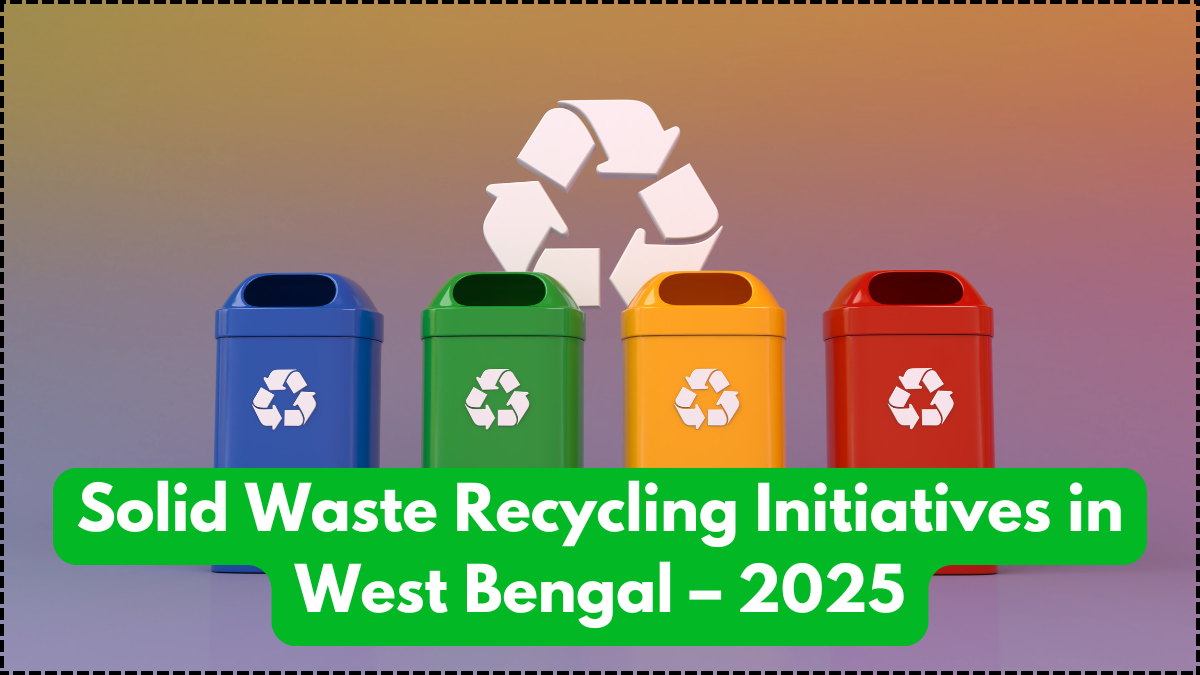West Bengal is taking big steps toward a cleaner, greener future with the launch of Solid Waste Recycling WB 2025 initiatives. The state is implementing new methods for managing waste, from doorstep collection to advanced recycling centers. With cities growing rapidly, waste generation has been a serious challenge—but now, structured policies and action plans are starting to make a visible difference.
A major part of this effort is the focus on municipal program development. Local municipalities are being equipped with resources, training, and technology to handle waste more efficiently. The goal is simple: to transform waste management into an organized system that supports both the environment and public health.

Why Waste Recycling Matters More in 2025
The Solid Waste Recycling WB 2025 mission is not just about removing garbage—it’s about rethinking how waste is used. Recycling plastic, paper, glass, and even organic waste can create new materials, reduce landfill pressure, and generate employment opportunities.
The government is rolling out every municipal program with clear guidelines for segregation at source, community participation, and public awareness campaigns. This shift is turning citizens into active partners in keeping neighborhoods clean.
Key Elements of the Recycling Drive
The Solid Waste Recycling WB 2025 strategy is multi-layered. It includes several crucial components that are transforming waste management across the state:
-
Mandatory segregation of waste into wet, dry, and hazardous categories
-
Creation of centralized recycling hubs in urban areas
-
Deployment of modern collection vehicles under every municipal program
-
Awareness drives to educate citizens about recycling habits
-
Incentives for industries that use recycled materials
These elements show how recycling is becoming a structured, long-term solution instead of a short-term fix.
West Bengal Recycling Programs – 2025 Snapshot
Here’s a table summarizing how Solid Waste Recycling WB 2025 is being implemented through various municipal program efforts.
| City | Municipal Program Initiative | Focus Area | Key Benefit |
|---|---|---|---|
| Kolkata | Door-to-door waste collection | Wet and dry segregation | Cleaner streets and neighborhoods |
| Durgapur | Recycling hub setup | Plastic and metal reuse | Reduced landfill waste |
| Siliguri | Composting units in housing areas | Organic waste management | Fertilizer for agriculture |
| Asansol | Waste-to-energy project | Industrial waste recycling | Power generation from waste |
| Howrah | Digital tracking of collection | Smart municipal program planning | Better monitoring of services |
How Citizens Can Support Recycling
The success of Solid Waste Recycling WB 2025 depends on participation from every household. Citizens can contribute by segregating waste, using designated bins, and cooperating with municipal program collection schedules.
Schools, residential societies, and businesses are also being urged to adopt recycling-friendly practices. Small steps—like reusing containers, reducing single-use plastics, and composting kitchen waste—collectively make a major impact.
Conclusion
The Solid Waste Recycling WB 2025 initiative represents a shift from reactive to proactive waste management. By focusing on municipal program improvements and encouraging public participation, West Bengal is turning its waste challenge into an opportunity for cleaner streets, healthier communities, and a greener future.
FAQs
What is Solid Waste Recycling WB 2025?
It’s a state initiative to improve waste management through recycling, composting, and responsible disposal systems.
How do municipal programs contribute to recycling?
Each municipal program supports collection, segregation, and recycling efforts with trained staff and modern equipment.
Which cities are leading the recycling drive in West Bengal?
Cities like Kolkata, Siliguri, and Asansol are major hubs for Solid Waste Recycling WB 2025 efforts.
Can households directly participate in recycling efforts?
Yes, by segregating waste and cooperating with municipal program guidelines, every household plays a key role.
Are there incentives for industries to use recycled materials?
Yes, the government provides benefits for companies that actively incorporate recycled products into manufacturing.
Click here to learn more